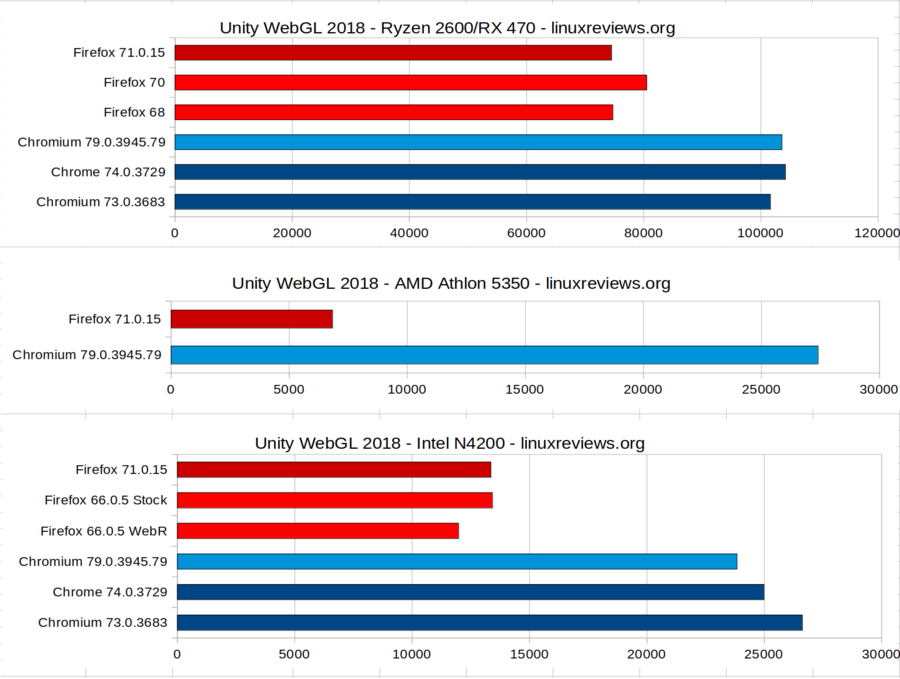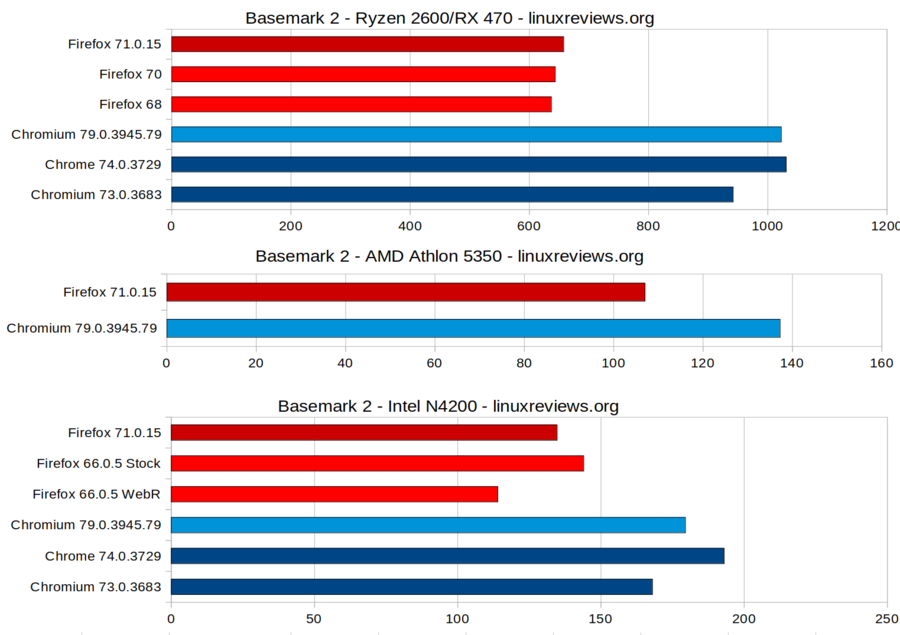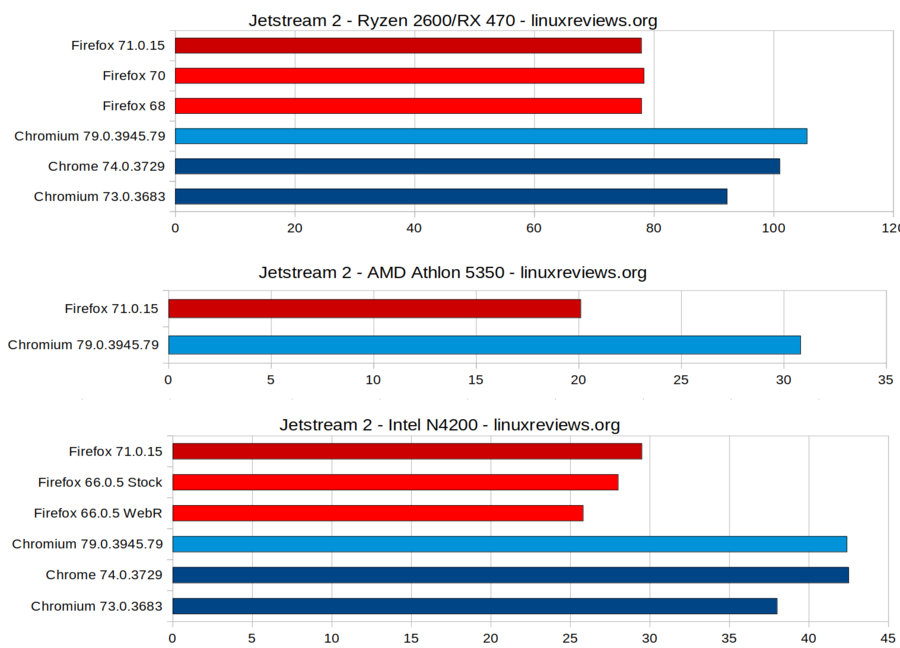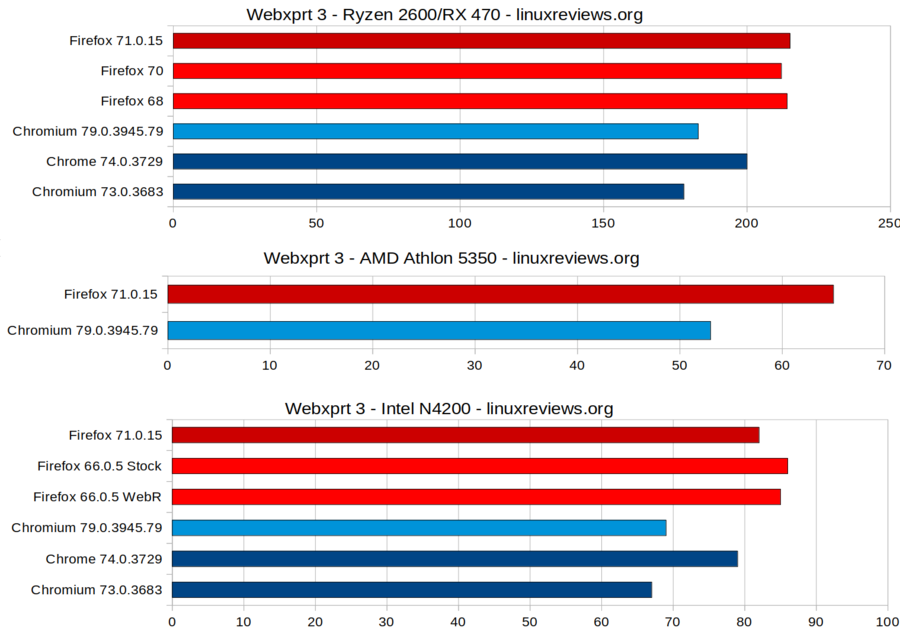Web Browser Performance: Chromium 79 vs Firefox 71
We tested the latest versions of Chromium and Firefox on three different systems to see which one is faster in four different tests. There is a clear winner when it comes to graphics performance as well as synthetic JavaScript and WebAssembly benchmarks. How much of a win depends on the hardware, how large the performance gap between Firefox and Chromium is very much dependant on how weak or strong hardware they are running on is.
written by 林慧 (Wai Lin) 2019-12-26 - last edited 2020-01-18. © CC BY
The Setup[edit]
We tested Chromium 79.0.3945.79 and Firefox 71.0.15 using their default out of the box configurations on three different test-machines:
- An Acer laptop with a Pentium N4200 CPU/iGPU
- An AMD Athlon 5350 APU with four cores at 2.05 GHz and a TDP of 25W
- An AMD Ryzen 2600 with a RX 470 GPU
Two of these machines are rather weak and one is a more powerful modern desktop. The systems where chosen to get an idea how the browsers performance differs between weak and strong AMD machines and light Intel notebooks. No powerful Intel-powered desktop was included because we don't have one.
Default clean configurations means that extensions like uBlock Origin, which the majority of our readers use to block advertisements, trackers and other trash the modern web is riddled with, are not accounted for. It wouldn't make much of a difference since the tests shown below do not include lots and lots of advertisements and uBlock Origin, and similar content cleaners, remove the same amount of garbage regardless of which browser it's running on.
Graphics Performance[edit]

The Unity WebGL 2018 benchmark.
The Unity 2018 WebGL Browser benchmark tests graphics performance and nothing else.
Chromium wins the graphics test hands down. The difference between WebGL performance in Chromium and Firefox is huge on the Ryzen 2600 with a dedicated RX 470 GPU, it's a win. But that win is small compared to the gaps on the weaker systems. Firefox is just horribly slow on the AMD Athlon 5350, its WebGL performance is one third on that system. It is not that bad on the Intel Pentium N4200 but it is pretty bad: Firefox comes in with a score which is barely more than half of Chromium's performance.
Basemark 3[edit]
The Finnish Basemark Web 3.0 has a lot of different tests meant to reflect a variety of real-world use-cases.
Chromium wins this test hands down. Basemark 2 does include some WebGL which, as the Unity WebGL 2018 test demonstrates, is something Firefox is specially bad at. The performance difference is not as gigantic as it is in the WebGL test. It is nevertheless a very clear win for Chromium.
JetStream 2[edit]
JetStream 2 is "a JavaScript and WebAssembly benchmark suite" which runs a series of purely synthetic tests. These tests do say something about a browsers performance and the total score can be compared. It's not a great test and its results do not say too much about real-world use. They are interesting nevertheless.
Chromium wins this test too.
Webxprt3[edit]
Webxprt3 by almost entirely Intel-funded "independent" Intel-front Principled Technologies is a fairly large and comprehensive test. It simulates various tasks and tries to reflect real-world use. It tests some odd things nobody does in a web browser ever, like optical character recognition (OCR), but tests like that are the exception.
Webxprt3 is the only test where Firefox really shines. It beats Chromium on all the test-machines.
Conclusions[edit]
Chromium has long held the position as the fastest web browser when it comes to everything which involves WebGL and graphics drawn with JavaScript. This was true for Firefox 68 vs Chromium 75 and it's still true when it comes to Firefox 71 vs Chromium 79.
Chromium wins in the Basemark and JetStream tests too. JetStream does not have any graphics, only synthetic JavaScript and WebAssembly tests. This makes Firefox's win in Webxprt3 by practically Intel subsidiary Principled Technologies an oddity. Yet that may be the test which most closely resembles everyday web browsing as well as performance in typical web applications. That makes a overall Chromium-win a little less clear-cut as the Unity WebGL and JetStream 2 results would indicate - unless you plan on looking at graphs or images generated on-the-fly from data from a websocket or something like that. Chromium really is much better at those kind of work-loads.
There is a few other pros and cons beyond performance which we do feel compelled to point out:
- Most GNU/Linux distributions include a VAAPI patch-set for Chromium which has been floating around for years. You can check if Chromium has it by visiting its special
chrome://gpupage where "Video Acceleration Information" is indicated. Supported resolutions are listed if Chromium has the video acceleration patch-set, nothing is listed if it doesn't. The Google-branded Chromium called Chrome does not have this patch-set and it never will. Firefox has no video acceleration support and its overall poor graphics performance combined with it using Rust to send audio to PulseAudio means that it simply won't play videos smoothly on weaker hardware. - Google is still hell-bent on removing support for advertisement filters from Chromium. This is not a problem in Chromium 79 but it may become a major difference in the future. The modern web is essentially unusable without something like uBlock Origin (available for current versions of both Chromium and Firefox today, Firefox would be the obvious choice if Chromium drops support for advanced third party extensions tomorrow).
Which browser you prefer is a very personal choice. We included links to all the tests so feel free to test how Firefox and Chromium and other browsers perform on your system and draw your own conclusions.






Enable comment auto-refresher